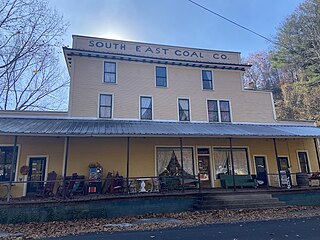
Letcher County is a county located in the U.S. state of Kentucky. As of the 2020 census, the population was 21,548. Its county seat is Whitesburg. It was created in 1842 from Harlan and Perry counties, and named for Robert P. Letcher, Governor of Kentucky from 1840 to 1844.

Whitesburg is a home rule-class city in and the county seat of Letcher County, Kentucky, United States. The population was 2,139 at the 2010 census and an estimated 1,875 in 2018. It was named for John D. White, a state politician.

Appalachia is a socio-economic region located in the central and southern sections of the Appalachian Mountains of the eastern United States. It stretches from the western Catskill Mountains of New York state into Pennsylvania, continuing on through the Blue Ridge Mountains and Great Smoky Mountains into northern Georgia and Alabama. In 2020, the region was home to an estimated 26.1 million people, of whom roughly 80% were white.
Appalshop is a media, arts, and education center located in Whitesburg, Kentucky, in the heart of the southern Appalachian region of the United States.

Harry Monroe Caudill was an American author, historian, lawyer, legislator, and environmentalist from Letcher County, in the coalfields of southeastern Kentucky.

Seco is an unincorporated community in Letcher County, Kentucky, United States. Located in the eastern part of the state, it lies about 6 miles (9 km) E of Whitesburg. The area was inhabited in the late 19th century, but did not receive a post office until 1915: the name derives from the South East Coal Company, which owned the land. The mines are now defunct, although a small mine may still be visited, to some extent, about 500 feet from the center of town. The main business is the small Highland Winery, established in the mid‑1990s. Tom Gish, longtime publisher of The Mountain Eagle weekly newspaper in nearby Whitesburg, was born in Seco.

Gurney Norman is an American writer documentarian, and professor.
Jeff Biggers is an American Book Award-winning historian, journalist, playwright, and monologist. He is the author and editor of ten books. His most recent book, In Sardinia: An Unexpected Journey in Italy, is a cultural history and travelogue of the island.
The University of Tennessee Press is a university press associated with the University of Tennessee.

In the United States, the Hillbilly Highway is the out-migration of Appalachians from the Appalachian Highlands region to industrial cities in northern, midwestern, and western states, primarily in the years following World War II in search of better-paying industrial jobs and higher standards of living. Many of these migrants were formerly employed in the coal mining industry, which started to decline in 1940s. The word hillbilly refers to a negative stereotype of people from Appalachia. The term hillbilly is considered to be a modern term because it showed up in the early 1900s. Though the word is Scottish in origin, but doesn't derive from dialect. In Scotland, the term "hill-folk" referred to people who preferred isolation from the greater society and the term "billy" referred to someone being a "companion" or "comrade". The Hillbilly Highway was a parallel to the better-known Great Migration of African-Americans from the south.

Appalachian studies is the area studies field concerned with the Appalachian region of the United States.
Lee Sexton was an American banjo player from Letcher County, Kentucky. He began playing the banjo at the age of eight and was proficient in the two-finger picking and "drop-thumb" (clawhammer) traditional styles of east Kentucky. He also sang and played fiddle. His Whoa Mule album includes recordings from a 1952 home recording with fiddler Fernando Lusk to recordings made in 2001. Four solo songs also appear on Smithsonian Folkways album Mountain Music of Kentucky.
Tom Gish was an American newspaper reporter and editor, best known for his work as the owner and co-editor of The Mountain Eagle weekly newspaper alongside his wife, Pat Gish, in Whitesburg, the county seat of Letcher County, Kentucky, where his paper was the first in the eastern part of the state to challenge the damage caused to the environment resulting from strip mining.
Stranger with a Camera is a 2000 documentary film by director Elizabeth Barret, investigating the circumstances surrounding the 1967 death of filmmaker Hugh O'Connor. Barret was born and raised in the region, and the film explores questions about public image and the individual's lack of power to define oneself within the American media landscape.
The Yancey County News was a weekly newspaper in Burnsville, North Carolina, serving Yancey County. In operation from 2011 to 2014, it was owned and operated by Jonathan and Susan Austin.
Letcher County Central High School (LCCHS) is a public high school containing grades 9–12 in the southeastern city Ermine of Letcher County, Kentucky, United States, about 15 miles from the Virginia border. The school opened in 2005 with its first graduating class in 2006. This is now the only high school in the district because it was built to combine all high schools of the district into one. However, it is not the only public high school in Letcher County, as the city of Jenkins and its immediate area are served by a separate school district that did not participate in the consolidation. LCCHS was rated bronze in the "US News Best High Schools" rankings.

Pat Gish was an American journalist, publisher and co-editor of the Whitesburg, Kentucky newspaper The Mountain Eagle, along with her husband, Tom Gish. The Gishes led The Mountain Eagle in covering controversial topics such as the effects of strip mining on the Appalachian environment and political corruption. Under the Gishes' guidance, The Mountain Eagle became a prominent rural newspaper, and the pair won many awards for their journalism. Gish also founded the Eastern Kentucky Housing Development Corporation and worked to improve living conditions in Eastern Kentucky.
Leonard Woods was an African-American man who was lynched by a mob in Pound Gap, on the border between Kentucky and Virginia, after they broke him out of jail in Whitesburg, Kentucky, on November 30, 1927. Woods was alleged to have killed the foreman of a mine, Herschel Deaton. A mob of people from Kentucky and Virginia took him from the jail and away from town and hanged him, and riddled his body with shots. The killing, which became widely publicized, was the last in a long line of extrajudicial murders in the area, and, prompted by the activism of Louis Isaac Jaffe and others, resulted in the adoption of strong anti-lynching legislation in Virginia.
Belinda Ann Mason was an American AIDS activist, policy advisor, and writer based in rural Kentucky. She was the first person with AIDS appointed to the U.S. National Commission on AIDS.








